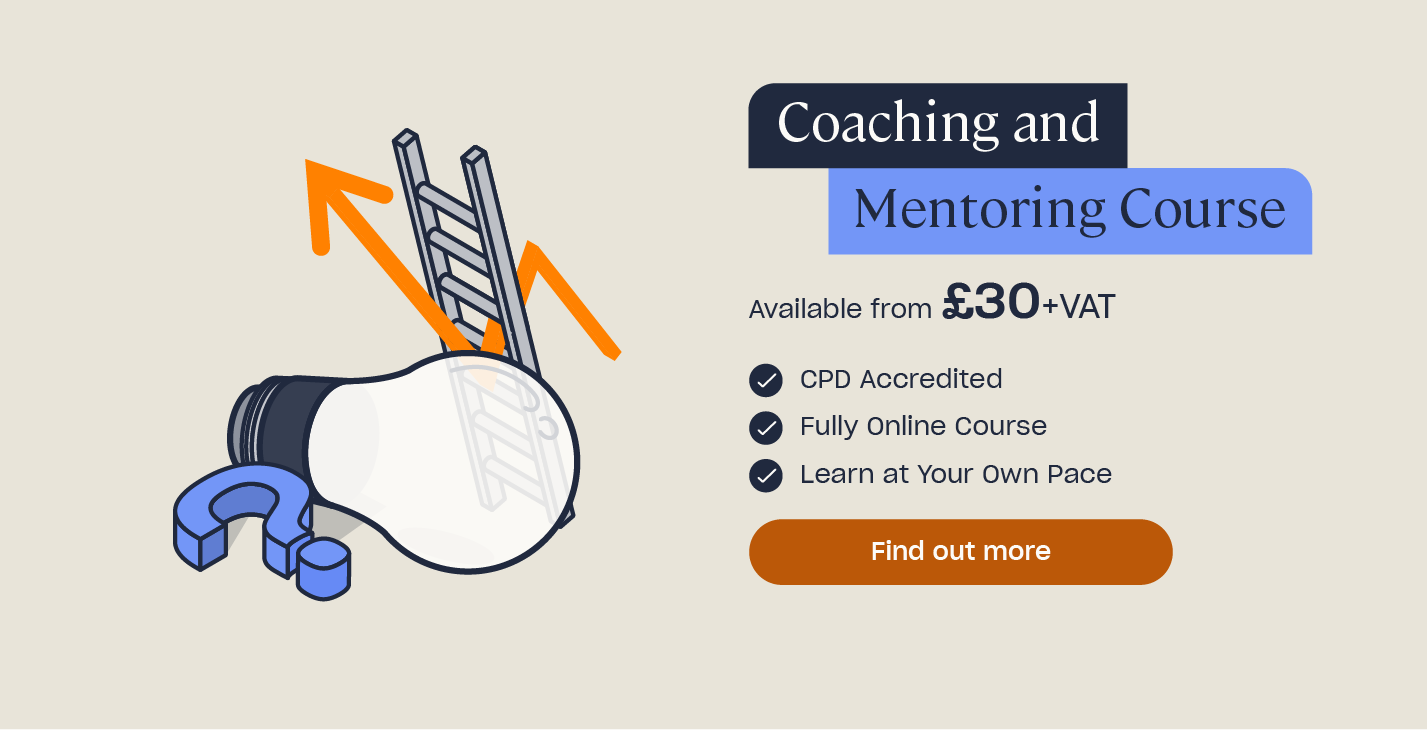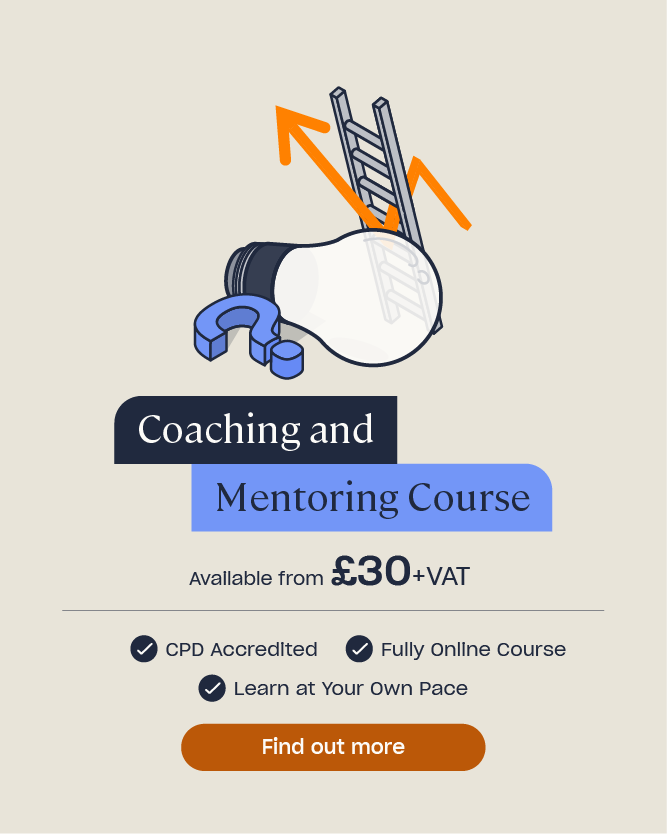How to Develop Coaching and Mentoring Skills
There are a range of skills that need to be acquired before you can become an effective coach or mentor. While some of these are obvious (such as active listening), others you may not have thought of. Becoming aware of the necessary skills and working on them can both improve your practice and help you to achieve personal growth.
In this article, we will discuss each skill, particularly looking at effective listening. We will then look at how to measure the success of your coaching or mentoring sessions, giving you some examples of evaluation questions to use.

What Skills Are Needed to Be an Effective Coach or Mentor?
Coaching and mentoring are increasingly popular processes where individuals receive guidance in order to develop their skills, knowledge, and experience, or meet their goals or objectives. The key difference between the two is that mentoring is directive (i.e., the mentor tends to do most of the talking during meetings, and may tell the mentee what to do), while coaching is non-directive (i.e., the coach gives the coachee the space to come up with their own conclusions and next steps, using techniques like questioning). Have a look at our article here for more information.
Despite the differences between coaching and mentoring, the skills required in order for them to be effective align very closely. These skills are as follows.
1. Active listening
Coaches and mentors need to listen actively in order to understand the coachee or mentee’s perspective, beliefs, and values, as well as barriers they face, and what they want to achieve. Effective listening involves engaging with the person speaking and showing them that you are giving them your undivided attention – this might include making eye contact and asking questions at relevant points, as well as putting your own thoughts and concerns aside. We will discuss this further in the section below.
2. Empathy and understanding
It’s important for coaches and mentors to be able to sense (or intuit) an individual’s state of mind, or in other words to ‘put themselves in that person’s shoes’. This will help you when you’re coming up with solutions that are right for them, or identifying limiting beliefs or other barriers that are restricting their growth – sometimes ones that even they are unaware of.

The ability to be empathic can be developed over time, with practice, so that you might sometimes have a ‘sixth sense’ in the form of a sudden thought or feeling that you want to share, which helps you make a breakthrough in your sessions. Being empathic and understanding can entail being less judgemental, and this is key in building relationships as a coach or mentor.
3. Questioning
Effective questioning allows you to elicit someone’s thoughts and opinions, focus their attention on coming up with a new idea or solution, and empower them to feel that they are an agent of change. Questioning is a particularly important strategy for coaches, who aim to guide or facilitate the coachee’s problem-solving and thought processes, rather than giving them solutions.
4. Communication
It is vital for coaches and mentors to be effective communicators so that they can discuss the individual’s personal thoughts, feelings, or issues sensitively, and can convey intended meanings rather than being ambiguous or coming across in the wrong way. This entails being able to anticipate how the other person might interpret your words and changing what you plan to say, if necessary.
If you are a coach, you should always remember to communicate in a respectful manner, making suggestions but giving the individual the option to disagree or take the discussion elsewhere (e.g. compare ‘What do you think of…?’ and ‘Is it OK if…?’ with ‘I think you should…’ and ‘Why didn’t you…?’). Have a look at our Communication Skills course for more information.
5. Giving feedback
You will need to be able to give your coachee or mentee feedback that is clear, specific, and honest, but also not judgemental nor overly negative. Focusing on negatives can discourage the individuals you work with. You should never blame the individual for something going wrong – in these situations, the conversation is more likely to go well if you focus on getting them to discuss what happened and what they think they could do differently in future, as a learning experience.

You should also give frequent positive feedback: acknowledge or appreciate their actions when they are effective, validate their successes and hard work, and feed back what you think their strengths are.
6. Goal-setting
This is particularly key for coaches, who need to be able to help the coachee articulate clear, well-defined, and motivating goals (e.g. SMART goals – those that are Specific, Measurable, Achievable, Relevant, and Time-based), and then discuss how the coachee’s actions are helping or hindering them in reaching those goals. You should help the coachee to be goal-oriented at all times, and to see obstacles as a means of improvement rather than being discouraged.
7. Checking in
You will need to regularly check in with the individual you’re working with, to ensure that they know what action they’re going to take, that they’re happy with it, and that they know what the next steps for your sessions will be afterwards (e.g. are they going to report back the action they took and what happened?). Additionally, you should check your own understanding with the individual regularly – summarise what you think they’ve said back to them, so that you know you are both on the same wavelength.
8. Enthusiasm
Enthusiasm is a discipline – you need intention and effort in order to maintain it, but it pays off in the long run. Being enthusiastic helps you to build relationships with individuals, making them more likely to trust you, and thus helping to get the best out of them.

Skills and Qualities of a Manager
The skills and qualities of managers are similar to those of coaches and mentors. In many cases, managers do act as coaches or mentors for members of their team. They guide them through day-to-day activities and help them improve their performance or develop their careers. They might also highlight individuals’ strengths, help them reflect on their practice, and help to empower them in their roles.
As a result, it’s important that managers work on the skills we have discussed. Certain areas of development may be more difficult for them, because unlike external coaches and mentors, managers are in a relationship of power with the individuals they work with, and they don’t have the same impartiality.
They have a vested interest in the individual’s performance which can, for example, lead them to jump in with solutions rather than giving the individual the space to come up with their own, or to have preconceived ideas towards the individual and their performance. To try to counteract this, they should particularly focus on asking open questions and being non-judgemental.
Why Are Effective Listening Skills Important in Coaching and Mentoring?
You will notice that listening skills were number one in our list above. This is no coincidence. Along with communication skills, they are fundamental to becoming an effective coach or mentor, since the basis of most coaching and mentoring sessions is discussion. The coach or mentor must listen attentively to the individual, understand what they’re saying, respond and reflect on it, and retain that information for later sessions.

How to Develop Effective Listening Skills
Examples of effective (or ‘active’) listening skills include:
- Maintaining eye contact with the person speaking (if possible), or nodding and displaying positive body language.
- Visualising what the speaker is saying, and focusing on this rather than your own thoughts or concerns.
- Not interrupting or completing sentences for them.
- Waiting for a pause and then asking relevant questions.
- Empathising with the speaker.
- Paying attention to nonverbal cues (e.g. posture, eye gaze, facial expressions).
- Summarising what the speaker has said back to them, to clarify your understanding of it.
In order to develop these skills, you could do active listening exercises with a colleague – for example, roleplay conversations where you hold all your questions until the end, or where you practise displaying positive listening behaviours at first and then non-listening behaviours, discussing how each one made you feel.
When you are in a coaching or mentoring session, maximise your ability to listen effectively by minimising distractions, being OK with silence, and aiming to speak around 20% of the time so that the individual can speak for the other 80%.
Once you know how to listen effectively, you are more likely to enhance your other coaching and mentoring skills in turn.
How to Develop Other Coaching and Mentoring Skills
It is likely that you will need to work on some of the skills we listed above to become more effective as a coach or mentor. You can do this by first identifying your areas of strength and weakness, and then setting goals. It may be helpful to acquire feedback from those you work with (both clients and colleagues) and then incorporate this into the goals. Remember to make your goals SMART (Specific, Measurable, Achievable, Relevant, and Time-based).
Once you have set the goals, you will need to come up with an action plan for meeting them. Consider seeking a mentor of your own to give you help and guidance throughout the process. Finally, remember to keep track of your progress and what you have achieved.
Want to Learn More?
If you want to develop your skills as a coach or mentor, our Coaching and Mentoring course will give you practical tools and techniques to help. Have a look at our course library to find out more about this and other courses.
Measuring the Success of Coaching
It is important to measure the impact that your coaching sessions have had. The individual you are working with may feel motivated and encouraged by seeing their progress and development, while you (as the coach) can adapt your practice in the future according to where you experience success.
You can measure the success of coaching in several ways, including:
- 360 degree feedback programs before and after the coaching process – these programs involve the individual being given confidential, anonymous feedback by their manager and peers.
- Employee engagement/satisfaction surveys.
- Completion or progress toward individual development plans/action plans.
- Achievement of coaching objectives.
- Rate of promotion or promotability.
You should agree how you will measure success or impact upfront – this is why you need to come up with coaching objectives that both you and the coachee agree on. For example, this might involve the individual feeling prepared for a future promotion.

Coaching Evaluation Questions
Coaching evaluation questions are another way to measure and evaluate the success of coaching sessions. These questions prompt the individual to:
- Identify the focus and outcomes – e.g. what do you want to get out of the coaching sessions?
- Decide what success might look like – e.g. how will you know that you’ve achieved your goal?
You should write the answers to these questions down – for example, in a coaching evaluation form – and share it with the coachee as a reminder of what you are working towards.
Throughout the coaching process, you should ensure that you and the coachee give each other regular feedback on progress towards goals, and how helpful they are finding the sessions.
In order to develop your coaching and mentoring skills, it’s important to understand what skills are required of you, how you can use these skills effectively to help others, and how you can measure your success in this area. You may require professional development training in order to do this, and you should focus on continuous learning for yourself as well as for the individuals you work with.
Further Resources:
- Coaching and Mentoring Course
- What is Instructional Coaching?
- What are Transferable Skills?
- Leadership and Management Quiz
- 6 Types of Leadership: Which Leadership Style is Right For Me?
- Tips for First Time Supervisors
- How to Motivate a Team











